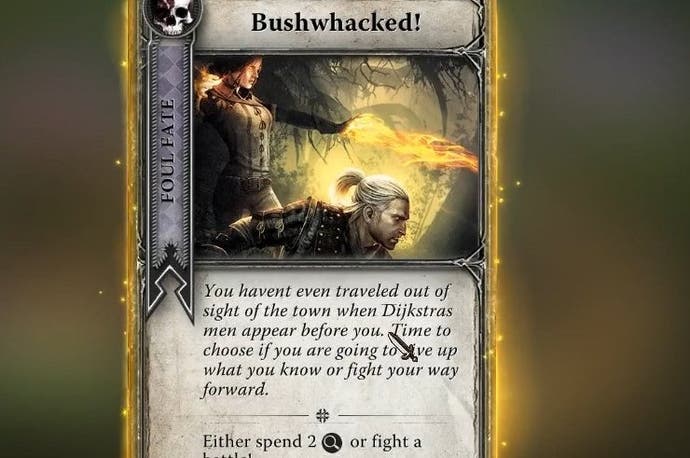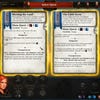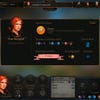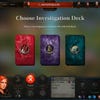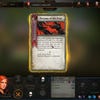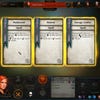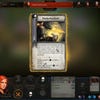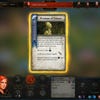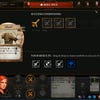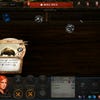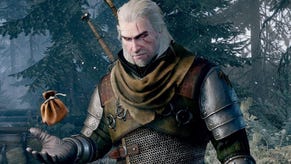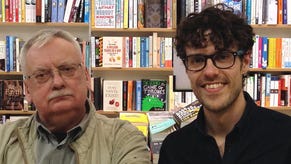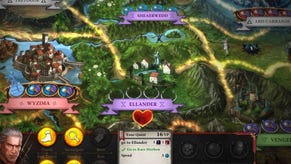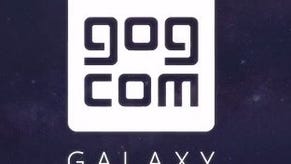Playing The Witcher Adventure Game multiplayer beta
A worthy distraction?
How would the grisly cinematic adventures of a mutant monster hunter called Geralt transpose to a board game? Could it cope with more than one lead character? Would it support drawn-out strategies? How would it work in turns? The questions were plenty - has The Witcher Adventure Game convincingly answered them?
In the closed beta the signs are promising; I've scratched the surface of deeper strategy and enjoyed the rich and pleasant company of the game. There's detail, personality and camaraderie as players chat between turns, talking of this and of that.
I'm not allowed to present the game in video because CD Projekt Red (The Witcher studio) isn't ready for that yet, but I can share screenshots and talk about my experience so far. Bear in mind that things will be honed, tweaked and changed as time goes on. I'm in early, so to speak. If you've pre-ordered The Witcher 3 on GOG, you'll probably find that you're invited to play too, so go check - more people are joining every day and the experience improves because of it.
Remember that The Witcher Adventure Game will also be a proper physical board game as well as a digitised version when released this autumn. It's coming out on PC and Mac as well as iOS and Android tablets. There's only online multiplayer at the moment (match-made or private), but the full version will have AI opponents and local hotseat multiplayer.
Let's start with the 'why?': CD Projekt Red told me The Witcher Adventure Game came about because someone pitched an idea the studio liked and decided to pursue. This wasn't, the studio assured me, rampant merchandising. The brain behind the game is decorated Polish board game designer Ignacy Trzewiczek and the muscle is Fantasy Flight Games.
The Witcher Adventure Game is a relatively complex beast, with decks of cards to draw from, dice to roll, unique spells and powers to collect and choose between and beasties to fight. It's not Dungeons & Dragons but it's for adults of a certain frame of mind.
Matches are won by the player who has the most Victory Points when the set number of main quests are completed: one (takes 10-20 minutes), three (takes 40-70 minutes) or five (takes 90-120 minutes). Shorter games are a blinkered rush to the finish but longer games reward deeper strategies, which is why they're the most rewarding to play - especially with the full complement of up to four players, if you can find them.
Main quests award the most Victory Points but require you satisfy objectives first, which usually means having the correct number - and colour - of proofs, as in the kind detectives seek. You're a detective here, really, and you amass proof by collecting evidence, and you get evidence by performing Investigations. They're a type of action, Investigations, and you can perform two actions per turn.
The other actions are Travel, Fast Travel, Development, Rest and Special. Travelling takes you to other regions on the board, which offer you different colour Investigations or places to heal wounds - penalty markers that prevent you using certain actions.
Fast Travel moves you further but at the cost of a Foul Fate card - a card that's probably bad news. Exactly how bad that news is, you'll wait and see. You may be ambushed by an enemy and face the decision of spending collected evidence to overcome it, or by doing battle.
Combat is a roll of the dice and a question of whether you can land enough sword icons and shield icons to satisfy the win requirements of the enemy you're facing. Thankfully you can use modifiers to affect the outcome and greatly increase your chance of success, which is why using the Develop action to find these modifiers is a good idea early on. No sense rushing to finish a quest only to be riddled with wounds and other handicaps that will set you back later on.
Combat modifiers are dependent on the character you're playing as, and there are four to choose between: Geralt, Triss, Yarpen and Dandelion. You can't double-up, so if you pick last, you get what you're given.
As well as character-specific abilities, each player can choose to perform a character-specific Special action each turn. Geralt and Triss can recharge their special ability cards, albeit it in slightly different ways; Yarpen can choose two of four dwarf minions to do things for him; and Dandelion can on-the-spot earn two gold (which pays for his Develop cards among other things). Different characters also start the game in different regions, with different amounts of gold and different resource change rates - ie how many proofs you need to exchange for an evidence.
Mixing all of this up further is a War Track - a spinning dial that gradually increases the monster difficulty in regions over time. You can also receive Foul Fate tokens as penalties (that linger on actions until you use them, forcing you to draw a Foul Fate card) and Good Fortune cards (that generally help you out) along the way. It all piles up!
The beauty of playing The Witcher Adventure Game as a computer game is that, as complicated as this all sounds, you can stumble through early matches not really knowing what you're doing. There are only ever a few things to choose between doing and options glow when they can be used. Were this you and some friends and a board game, one of you would have to do a lot of rulebook-reading first.
And then soon, as you re-read the tutorial screens and ask other players how things work, your stumble disappears and those decisions, those choices, are done with understanding. That's when The Witcher Adventure Game - like other board games - comes into its own.
How would the grisly cinematic adventures of a mutant monster hunter called Geralt transpose to a board game? As a different kind of experience, and very well.
